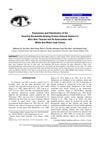
Thermal spring waters and their microbes could be good for skin health and treating some skin conditions in skincare products.
 65 citations,
August 2007 in “Experimental Dermatology”
65 citations,
August 2007 in “Experimental Dermatology” Human hair follicles can make and process prostaglandins, which may affect hair growth.
 9 citations,
July 1995 in “Veterinary Clinics of North America: Small Animal Practice”
9 citations,
July 1995 in “Veterinary Clinics of North America: Small Animal Practice” The document concludes that hair loss in cats is caused by various factors, including allergies, mites, infections, and hormonal issues, with treatments varying accordingly.
[object Object]  82 citations,
September 2018 in “Nature Communications”
82 citations,
September 2018 in “Nature Communications” A certain smell receptor in hair follicles can affect hair growth when activated by a synthetic sandalwood scent.
 35 citations,
February 2006 in “Textile Research Journal”
35 citations,
February 2006 in “Textile Research Journal” Enzymes xylanase and pectinase clean wool and specialty hair fibers effectively without damage, offering an eco-friendly alternative to soap and hot water.
 27 citations,
April 2018 in “Journal of autoimmunity”
27 citations,
April 2018 in “Journal of autoimmunity” iNKT cells can help prevent and treat alopecia areata by promoting hair regrowth.
 27 citations,
June 2013 in “Genes & development”
27 citations,
June 2013 in “Genes & development” Cav1.2 affects hair growth and could be a target for hair loss treatments.
 25 citations,
September 2020 in “Molecules”
25 citations,
September 2020 in “Molecules” Quercitrin may help treat hair loss by promoting hair growth and improving cell health.
 19 citations,
March 2003 in “Journal of Investigative Dermatology”
19 citations,
March 2003 in “Journal of Investigative Dermatology” Mechlorethamine treatment regrew hair in mice by killing immune cells causing hair loss without harming hair follicles.
 14 citations,
March 2002 in “The journal of investigative dermatology/Journal of investigative dermatology”
14 citations,
March 2002 in “The journal of investigative dermatology/Journal of investigative dermatology” Patients with severe alopecia areata have higher levels of MIF, which decrease after successful treatment.
 11 citations,
January 2017 in “Oxidative medicine and cellular longevity”
11 citations,
January 2017 in “Oxidative medicine and cellular longevity” Antroquinonol may help prevent skin depigmentation by suppressing certain immune cells.

Tiny particles called extracellular vesicles show potential for improving skin health in cosmetics, but more research is needed to confirm their safety and effectiveness.
 January 2024 in “Biomedical journal of scientific & technical research”
January 2024 in “Biomedical journal of scientific & technical research” Vitamins A, B7, C, D, and E are essential for healthy hair growth and preventing damage.
April 2019 in “Journal of the Endocrine Society” An over-the-counter vitamin/mineral supplement improved hair loss and blood sugar control in a woman with non-classic 11-hydroxylase deficiency.
45 citations,
September 2000 in “Archives of dermatology” The study found that the enzyme linked to acne is present in the same areas of both acne-affected and normal skin.
 3 citations,
November 2021 in “Applied Microscopy”
3 citations,
November 2021 in “Applied Microscopy” Hair microscopy is a simple and cost-effective method to help diagnose systemic diseases in children.
 September 2023 in “Cureus”
September 2023 in “Cureus” Dr. SKS Hair Booster Serum effectively treats hair loss in women with PCOS.
August 2024 in “Journal of Photochemistry and Photobiology B Biology” Combining light therapy with certain substances improves hair growth in people with hair loss.
 18 citations,
July 2022 in “Frontiers in Immunology”
18 citations,
July 2022 in “Frontiers in Immunology” Volatile organic compounds can cause inflammation and increase the risk of autoimmune diseases.
10 citations,
August 2021 in “Cosmetics” The best shampoo formula used 1% high-weight hyaluronic acid, 10% acidic sophorolipid, and 1% salt for effective hair conditioning and cleansing without sulfates or silicones.
 12 citations,
May 2023 in “EMBO reports”
12 citations,
May 2023 in “EMBO reports” High mTORC1 activity slows hair growth and causes it to lose color.
126 citations,
August 2018 in “Molecular Systems Biology” Fibroblast state switching is crucial for skin healing and development.
32 citations,
December 2019 in “The Journal of clinical investigation/The journal of clinical investigation” A protein called IL-36γ causes skin side effects from certain cancer treatments when combined with a common skin bacteria.
 6 citations,
December 2022 in “Cell reports”
6 citations,
December 2022 in “Cell reports” Eating a high-fat fish oil diet caused mice to lose hair due to a specific immune cell activity in the skin linked to a protein called E-FABP.
 4 citations,
December 2022 in “The journal of investigative dermatology/Journal of investigative dermatology”
4 citations,
December 2022 in “The journal of investigative dermatology/Journal of investigative dermatology” Human scalp hair follicles can produce hormones and have a system similar to a brain-body communication network.
2 citations,
January 2020 in “Evidence-based Complementary and Alternative Medicine” Hataedock treatment improved skin health and reduced atopic dermatitis symptoms by enhancing the skin barrier and reducing inflammation.
 1 citations,
September 2023 in “Molecules (Basel. Online)”
1 citations,
September 2023 in “Molecules (Basel. Online)” Plant sterols have health benefits like lowering cholesterol, but more research is needed to understand their effects and improve their extraction and sustainability.
[object Object]  October 2023 in “Dermatological reviews”
October 2023 in “Dermatological reviews” Fibroblast-derived growth factors and exosomes can significantly improve skin aging.
August 2022 in “International Journal of Molecular Sciences” DNA methylation controls lncRNA2919, which negatively affects hair growth.
 1 citations,
January 2016 in “Asian-Australasian journal of animal sciences”
1 citations,
January 2016 in “Asian-Australasian journal of animal sciences” The protein Gnαs is found more in black mice than white mice and may influence their coat color.






















